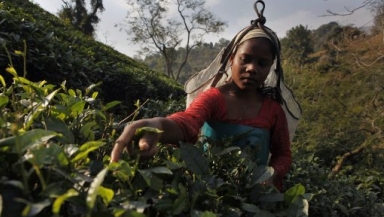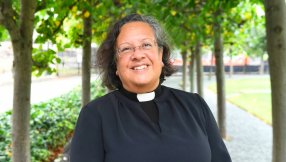
Climate change is an issue the Church of England has to face up to and take action on by redirecting its investments, its parliamentary body heard today.
There was overwhelming support for a motion put forward by the Reverend Canon Giles Goddard, of Southwark Diocese, calling for the Church to recognise "the damage being done to the planet through the burning of fossil fuels".
To help address this issue, the motion calls the Church of England's Ethical Investment Advisory Group (EIAG) to ensure "that their investment policy is aligned with the theological, moral, and social priorities of the Church".
The Church has through its ongoing Shrinking the Footprint campaign been actively encouraging member churches to make care for the environment a priority and do what they can to make their buildings as green as possible.
In his opening speech, Canon Goddard told of a village in Mozambique known as 'Sack place' because of the size of the bags needed to carry away the huge quantities of vegetables yielded by the fertile soil.
"Every year they planted seeds on October 15 knowing that the rains would come within the next day or two. The nearby river was full of fish.
"Today life is dramatically different and radically harder. The river has dried up so no more fish. Crop yields have collapsed as a result of flooding, successive droughts, and extreme temperatures.
"The issue of climate change is real and it is happening."
Canon Goddard pointed out the moral case from a Christian point of view: "Care for the Earth, as a gift of the Creator, is in many ways foundational for the Gospel. We have the responsibility, expressed for example in the Genesis story and in the covenant with Noah, to care for God's creation."
He added: "Climate Change is a moral issue because the rich world has disproportionately contributed to it and the poor world is disproportionately suffering."
Many members of the General Synod supported this motion with the Bishop of Sheffield, the Right Reverend Stephen Croft saying: "The threat of climate change is a giant evil, a great demon of our day. The damage this great demon will do to this beautiful earth if unchecked, is unimaginable."
The Reverend Professor Richard Burridge, the deputy chair of the Ethical Investment Advisory group, said that despite scientists continually warning about the damage being done by climate change, the Church and wider society "do little to mitigate or adapt to it".
Madeleine Ratcliffe Holmes, one of the Church of England Synod members for Europe said: "You cannot argue about this amazing world that God has given us, and you cannot argue about what we are doing to the environment."
Issuing a challenge to the Synod members, and the Church more widely, Janet Appleby of Newcastle Diocese said: "Are we prepared to live more simply so that others may simply live?"
However, not all members were supportive. Tom Sutcliffe of Southwark Diocese called for multiple amendments to scale back the motion and turn it into a call for a constant dialogue.
"The Church can make very little difference, whether it invests ethically or unethically," Mr Sutcliffe claimed.
"What the Church can do is to push forward an informed dialogue."
He suggested putting in a change to refer to "excessive" burning of fossil fuels, something the Synod as a whole resisted.
"Arguing over what is excessive burning is distracting," said Rosalind Rutherford of the Winchester Diocese. "All burning of fossil fuels is excessive."
Mr Sutcliffe also suggested a change where the Church would acknowledge that "rapid and massive human population may be threatening many creatures and plants that share the planet with us".
Canon Goddard called the amendment "insidious" and suggested a concern that this would redirect responsibility for these issue from the rich, to the poorer world.
In the end, none of Mr Sutcliffe's amendments were attached to the motion.
The only amendment to be successfully attached was one from Canon Margret Swinson of Liverpool, who called for the re-formation of the Shrinking of the Footprint working group to co-ordinate the Church's environmental policies.
"Climate change is complex but real," said Synod member Philip Fletcher. "The Church needs to make its voice heard."
The final vote was 274 in favour, 1 against with 34 abstentions.
Christian Aid's Senior Climate Change Advisor, Dr Alison Doig, praised the Church of England for taking a stand on climate change as parts of the country lie under deep flood waters.
With a UN global deal on emissions expected in Paris next year and the publication of the Intergovernmental Panel on Climate Change report next month, she said the Church could now engage "prophetically" on climate change and "speak with a united voice for those suffering both here and abroad".
"As the Met Office has pointed out this week the recent record breaking rains and floods are the kind of climate change the UK can expect in a warming world," she said.
"Many of the poorest people in developing countries have already been experiencing the effects of climate change which is why this decision by the Church of England is so welcome.
"Climate change is increasingly becoming one of the moral issues of our time and the Church has a powerful voice with which to speak. This positive move shows a commitment to protect the planet and strive to help those suffering.
"The Church Commissioners are fortunate to have £8 billion under investment. With great wealth comes great responsibility and I'm encouraged to see the Church taking that responsibly seriously by reviewing their ethical investment policies."













